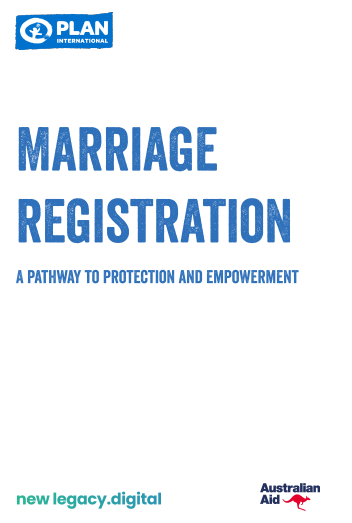(Newsletter: CRVS Insight March 2022)
CRVS systems have the power to transform the lives of women or girls. Marriage registration is a core component of the Government of Bangladesh’s holistic CRVS++ strategy. The importance of marriage registration has also been recognized as critical to help achieve the Government’s target of eradicating child marriage by 2041. While great progress has been made under the CRVS++ strategy in the area of birth and death registration, marriage registration progress is slower and registration remains paper-based.
Plan International, in partnership with the Government of Bangladesh, conducted a study to analyse and assess the current marriage registration system in Bangladesh in order to identify recommendations for both process and system improvements. The study assessed existing marriage registration processes, people’s knowledge and attitudes towards marriage registration, supporting IT systems, and existing initiatives. The study consisted of a sample size of 430 respondents spread over 3 locations: Dhaka (city corporation), Nilphamari (rural) and Bhola (peri-urban), and across Bangladesh’s main religious communities: Muslim, Hindu, Christian and Buddhist.
Some key research findings included:
- Not all marriages can be registered in Bangladesh due to the absence of an inclusive legal framework e.g. there is no legal way for a Buddhist to register their marriage;
- There is no clear unified marriage registration process and standards and practices vary from religion to religion;
- The number and availability of Marriage Registrars is limited and marriage registrars are not government employees so there is little accountability and motivation for them to register marriages;
- Marriage registration is still a paper-based process meaning there is no centralised view of marriage registration levels or discrepancies;
- Marriage registration data is not used to inform decision-making as part of an integrated CRVS system.
Based on these findings, it is clear that there are numerous opportunities to strengthen the marriage registration system in Bangladesh as part of a wider CRVS ecosystem. The research identified some key strategies to be incorporated within an integrated system strengthening approach. Some examples include:
- Standardise and simplify the marriage registration process across Bangladesh, updating the rules and regulations to be inclusive;
- Digitise marriage registration (data collection, processing and sharing) as part of an integrated digital CRVS system;
- Simplify certificate issuance and enable verification of marriage by authorised actors;
- Extend the role of Marriage Registrar to all relevant religious leaders and allow registrars to marry any type of marriage;
- Educate people on marriage registration and its importance;
- Visualise marriage registration data along with other vital events so that it is meaningful and actionable for policy makers;
- Develop a marriage registration strategy as part of the CRVS++ initiative and establish active marriage registration focused governance mechanisms to implement this strategy.
You can access the full research report here. If you are interested in conducting similar marriage registration research in your country context please contact Sophie Shugg from Plan International Australia - Sophie.Shugg@plan.org.au


